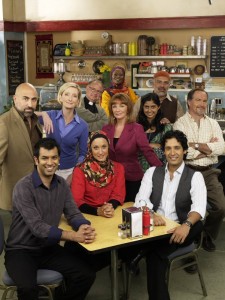Why Little Mosque Matters [Part 5]
 I want to thank the editors of Antenna for asking me to contribute a series of entries on Little Mosque on the Prairie. Talking about the notion of humor as a medium for translation, the forces at work in the show’s creation, the way jokes and sitcom conventions work at cross-purposes, and the challenges of distribution has helped me focus my thoughts in a very productive way. Now I’d like to take the opportunity once more to try to state, in the most concrete terms possible, what’s important about Little Mosque and why it matters, both to TV viewers and to television scholars.
I want to thank the editors of Antenna for asking me to contribute a series of entries on Little Mosque on the Prairie. Talking about the notion of humor as a medium for translation, the forces at work in the show’s creation, the way jokes and sitcom conventions work at cross-purposes, and the challenges of distribution has helped me focus my thoughts in a very productive way. Now I’d like to take the opportunity once more to try to state, in the most concrete terms possible, what’s important about Little Mosque and why it matters, both to TV viewers and to television scholars.
Why Little Mosque matters to viewers:
- Little Mosque was funny. Admittedly, this is a subjective opinion. Many critics found it “hokey” at best. (John Doyle, writing for the Globe and Mail, described it as “hokey as hell” and – consequently – “gloriously Canadian.”) What matters was the attempt by the show’s creator Zarqa Nawaz to take aspects of Islam that provoke a gut reaction of fear for many non-Muslims and use humor to cause them to take a second look. This was something new – its newness, in fact, was one thing that the CBC’s head of English comedy liked about it and one of the reasons he pushed for it to be green-lit. Even viewers who found that the show’s attempts at humor fell flat should appreciate the effort to find something new to air.
Why Little Mosque matters to television scholars:
- Little Mosque was the first North American sitcom about Muslims to feature an ensemble cast of Muslim characters. There are two important parts to this statement: the fact that Little Mosque was a sitcom and the fact that it featured a range of Muslim characters. Both of these were firsts. As a sitcom, the logics of representation differed from those of the news or dramas like 24. The structure of jokes allowed writers to say two things at once – jokes were funny because their literal meaning was juxtaposed against an ironic meaning. In this way, Little Mosque differed from the news, for example, where words’ literal meanings tend to predominate.
The ensemble cast was another feature of the show that set it apart. Nawaz wanted to show a spectrum of viewpoints, from conservative to liberal, and a range of degrees of religiosity, from fervent to “fence-sitting,” in her words. This is not to say that all Muslims found themselves represented in the show, of course, but the show did present a case to consider when looking at attempts to overcome stereotypes of the Muslim “other.”
- Little Mosque demonstrated both the potential and the limitations of a mixed public/commercial system for creating programs that humanize people outside of the cultural “mainstream.” The fact that the CBC had the mandate to present regional points of view was one impetus for taking a risk on the show, as was the mandate to represent Canadian multiculturalism, although that mandate’s role was secondary. As a result, the production of Little Mosque reveals one set of conditions under which the Orient/Occident binary identified by Edward Said breaks down: Little Mosque was created by a woman who is both Western and Muslim, and the many people involved in its production operated in a constantly reflexive manner. In other words, the show developed in a different set of circumstances than those that “so far as European interest in alien cultures is concerned, have always been commercial, colonial, or military expansion, conquest, empire” (Said, p. 139).
The commercial pressures affecting the CBC – a public broadcaster whose funding has dropped precipitously since the Conservative government of Brian Mulroney in the 1980s – limited what the makers of Little Mosque could do. For instance, Mary Darling and Clark Donnelly wanted to talk about how belief influences people, and as Darling explains, “There’s still a lot of religious content inside the show, we won some and lost some, but the push was always towards – we were always able to get a better hearing when we were like, ‘Hello! There’s a mosque in a church! Hello! Our characters believe in something.’” CBC executives, conscious of viewer expectations, thought that culture could motivate characters to belong to a religion, but they were resistant to the idea that belief itself could motivate them. As a result, the producers of Little Mosque could not explore religion’s influence to the degree they would have liked.
In the end, Little Mosque represented an incremental (not radical) break from programs that came before it. Many critics would have liked to have seen something edgier, a sentiment with which the executive producers agree. Darling says that one of their hopes is to be able to format the program, perhaps for the US market, and change the things that did not work the first time. I look forward to that possibility, although I suspect that the show would be shaped by similar pressures. In the meantime, however, I encourage viewers in the United States to watch Little Mosque, now that it has premiered on Hulu. It is a fun show, and it is imbued with a sense of hope that is uncommon in contemporary North American television.


